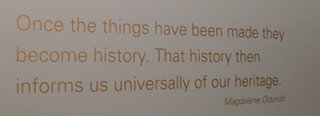While I was out cutting the grass my mind was wandering over a few things as it does.
[In fact I often use my garden as a place to reflect, the hands are occupied, the mind thinks it's occupied, and so the amazing capacities of the human mind are freer to roam and explore.]
Anyway, I was thinking over the conference again, and I thought about the incredible range of experience and knowledge that 300 dedicated people like the Europarc delegates have. imaging if we could really enjoy that experience and even apply it to specific practical issues. I'm thinking of something a bit deeper than a case study, more a kind of problem-solving session. Bear with me as I make this up as I go along ...
I can imagine people offering their own real current challenges up to the delegates. Each challenger would try and make their case as interesting, difficult, attractive, fascinating, whatever. Their aim would be to attract the experience of people committed to helping them in their challenge. People would sign up to join the challenge at the conference during a focused session. The structure and ground rules would need thinking about, but even they could be flexible depending on the challenge and the number of people involved.
I can imagine some of the practical and strategic issues I've faced in my work benefiting. Some complete blockage could be broken up with a brainstorming session to generate other ways of looking at it, and alternative ways of tackling it. I'm sure you can think of examples yourself.
There's something practical and incredibly valuable about sessions like this it seems to me. Sitting listening to speakers is all very well, but even with the best will in the world the question and answer session at the end hardly makes it interactive. We might as well be watching the TV. It's the interaction that is the best thing about getting together at conferences, and being able to focus that on helping each other out with a specific challenge or problem, or even to generate a few dreams, (why not?), surely that would be better for everyone?
Just a few thoughts off the top of my head...


